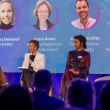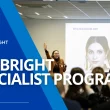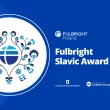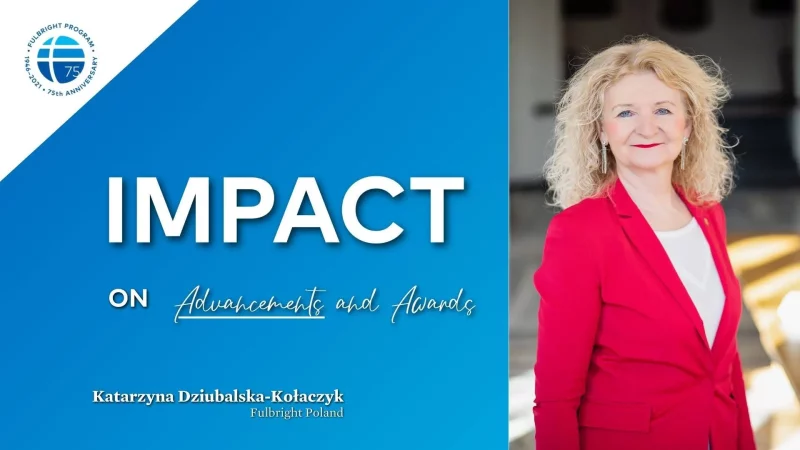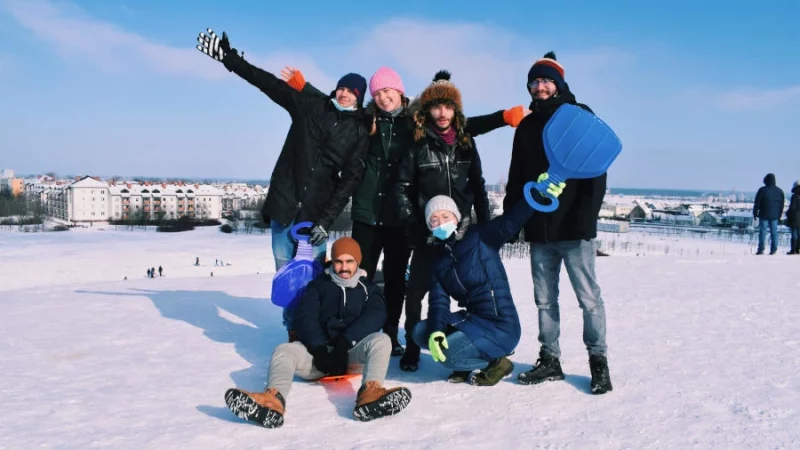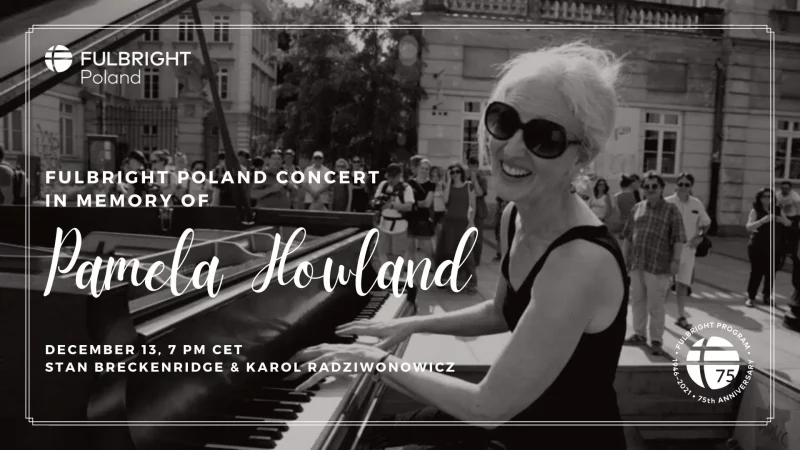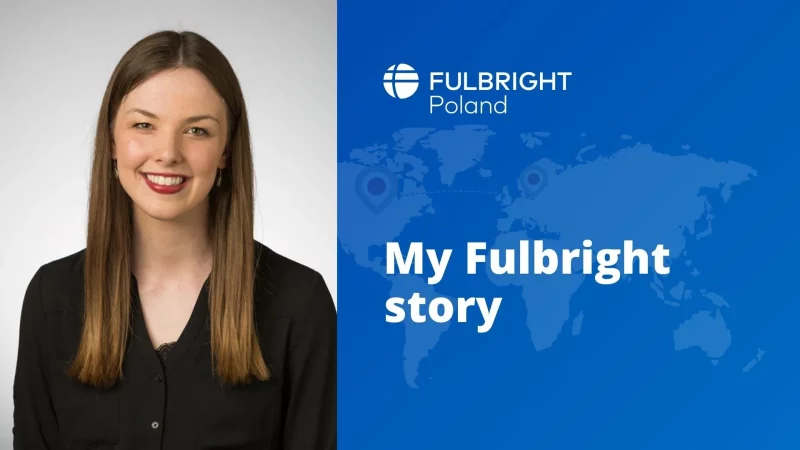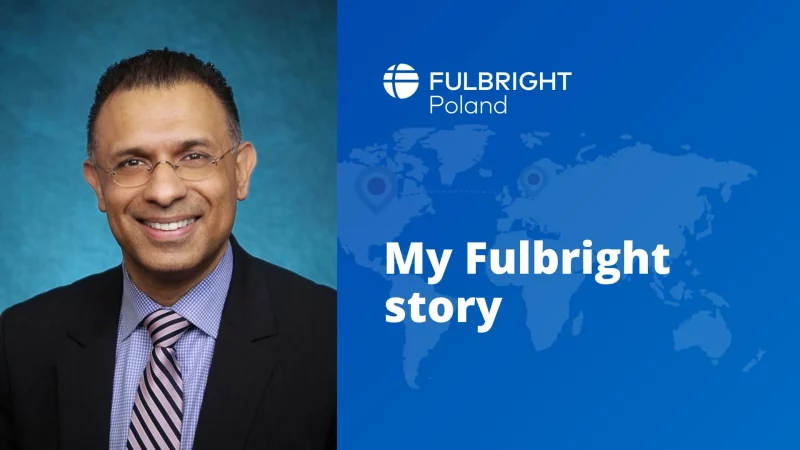The second alumna whose profile we are presenting this month as part of our celebrations of the Fulbright Program’s 75th Anniversary with the May theme “Advancements and Awards” is Prof. Katarzyna Dziubalska-Kołaczyk. In an interview conducted by our Fulbrighter Joanna Socha, Dziubalska-Kołaczyk talks about her research in the field of linguistics and how her Fulbright experience at the University of Hawaiʻi at Mānoa in Honolulu has impacted her professional and personal development.
As many as 90% of world languages will cease to exist in the next hundred years, warns professor of linguistics Katarzyna Dziubalska-Kołaczyk, who is vice-rector of Adam Mickiewicz University in Poznań (UAM) and chair of School of Languages and Literatures. This is why we need to draw from the language diversity for as long as we still can – she says.
Interview by Joanna Socha, Fulbright Poland alumna
Why did you decide to apply for a Fulbright grant?
I am a linguist. I studied English with specialization in linguistics in Poznań in the Faculty of English. For years, in our academic community, Fulbright has existed as one of the most prestigious and valuable scholarships in the world. Numerous people at UAM had received a Fulbright grant so it was very clear to me that this is a program that is worth fighting for.
My decision to choose the University of Hawaii as my host institution was governed by my research interests. I am mainly interested in phonetics and phonology – the science of sounds. I am fascinated by natural phonology. The authors of natural phonology are two American scientists: David Stampe and Patricia Donegan, professors at the University of Hawaiʻi at Mānoa in Honolulu – a place that is certainly unusual as a research destination because most people associate it with surfing. However, few people know that Hawaii is a linguist’s paradise! The Pacific Region encapsulates around 1400 languages in the world out of the approximate total of 7000 world languages. In Honolulu alone, we can hear up to one hundred languages in one day, which means we have an enormous diversity of languages. So I decided that it was best to go to the source, that is, to work among people who created a model that I myself believe in.
In what years did you participate in the program?
In 2001-2002. It was a special period because of 9/11. A huge tragedy. I was already in Hawaii then, but I was worried how it would affect my stay there, what would happen next and that maybe I would have to go back. For a while, aircraft traffic was halted and Pearl Harbor was shut down on the same day.
Have you already had a network of contacts in Hawaii prior to your Fulbright grant?
Not a big one. I was in contact with Patricia and David, I had a letter of invitation from them. Patricia was helping me to find an apartment. I also had a friend who was a Ph.D. Candidate there.
But I really appreciate it that I was able to go there with my family. My daughters were there with me in the U.S. and my husband visited us several times during that year.
What challenges did you face in the new place?
At the beginning, I had to figure out some formalities but it’s probably something normal.
A bigger challenge was finding a high school for one of my daughters. It was not a problem for the younger one, who was in middle school at the time because there was a really good public school in the neighborhood. The public high school in our neighborhood, however, did not have good reviews and I could not afford a private school. In the U.S. you are assigned to a school based on your home address and I had to work hard so that my daughter is admitted to a very good school that was further away from our house. I convinced the principal that we deserve to be included in the so-called “geographic exception” based on the fact that I was a guest of the Department of State. My efforts have proved fruitful. An interesting fact is that Bruno Mars attended that school at the same time as my daughter! Both of my girls loved their schools and they were at the top of their classes all this time.
Besides this small challenge, I reminisce upon this trip as a very successful one. The very word “aloha,” which Hawaii is famous for has many positive connotations. It could be a greeting, but it also denotes love, friendship etc. and you can even end your email with it. You can feel the “aloha” atmosphere anywhere you go there.
And how did the fact of being on a Fulbright grant with your kids affect your experience?
It has definitely helped me a lot. The fact that my daughters were there with me has made me much calmer. Moreover, I felt that I am doing something great not only for myself but also for them. I am also happy that my husband was able to visit us four times.
What kind of research did you conduct there?
I was working on a publication on phonology without a syllable. In my opinion, the syllable that we learn about from an early age, is not the basic unit of the organization of sounds. The more basic level is based on bits and bindings, the bits are the vowels and the consonants are attached to them. Therefore, it is not the syllable that is the basic unit. Many languages in the Pacific islands have such a simple structure, consisting of a sequence of vowel-consonant clusters (CV = Consonant Vowel). So I could draw examples from there and deepen my interest in phonotactics i.e. the rules of connecting sounds into sequences. The fact that in Polish, we have words such as “trzmiel” or “przestępstw z pstrągiem” – these words are almost impossible to pronounce for people from many countries, such as Japan. This is what interests me.
Part of my research was based on recording the statements of about fifty children speaking different languages at my younger daughter’s school. They were asked to read sentences that contained artificially created words. I wanted to learn how these children deal with different vowel and consonant clusters.
Thanks to my experiences with the program, I wrote a book on phonology without a syllable. This book has helped me advance to a full professor position in 2003. I also published several academic articles.
Were these your specific goals that you set for yourself during your stay in the U.S. – writing a book, publishing articles?
Yes, I was thinking about writing a book but I was not writing it there. I was more focused on deepening my knowledge and discussing my ideas with people.
I also had an initial idea about this subject in mind: I wanted to gather arguments “against” the syllable.
It seems that your stay in the U.S. has met your expectations.
Definitely. I remember this trip as one of the best life experiences for several reasons: I fulfilled my scientific goal because I had the opportunity to work with the creators of the theory that I had learned before. In addition, I wrote books and articles based on these experiences, and I undertook further scientific collaboration with many people.
I also got some non-research related benefits. I functioned in an incredibly diverse world, which is extremely important to me. I just think that diversity is crucial and monotony is very regressive. Progress occurs when people mix, in all ways.
In addition to all of this, I was in Hawaii – I have become a part of many beautiful, sunny places. What more could you ask for?
Apparently, it was thanks to you that many American grantees have later on come to Poland, and on the other hand, you also inspired others at the University in Poznań to apply for Fulbright grants.
I think that my lecture on the extinction of the world’s languages contributed to the promotion of the Fulbright Program. I discussed it for the first time at the TEDx conference in Poznań. I talked about, among other things, that it was Hawaii and the diversity of this place that encouraged me to think about the diversity of world languages. As many as 90% of the world’s languages will cease to exist in the next 100 years. This is devastating and inevitable, so let’s try to learn as much as we can about them and take advantage of this diversity for as long as we can.
The role of a linguist is to describe, preserve and archive as much as possible so that the knowledge of the languages and cultures of its speakers, as well as the knowledge contained within the languages survives. However, my stay in the U.S. on the Fulbright grant itself encouraged me to create more opportunities to invite American grantees in Poznań and to persuade students and employees to apply for Fulbright.
Do you keep in touch with professors from the U.S.?
Both Patricia and David have been to Poland several times after my return. In 2020, Professor Stampe, unfortunately, passed away, but I am still in touch with Patricia Donegan and we are even working on a joint publication, which – we hope – will turn out to be a breakthrough in the theory of natural linguistics.


